…and iron butterflies in the soul. Which “Belle du Jour” to rattle the ghosts in the cage of moral sentiments. Maybe men should get off the couch and take the trouble to find out instead of making virtue out of a closed mind; and a virtue of an unadventurous disposition…Can we ever dissolve the whore-madonna nexus? Are we doomed to our sentimentalities? Is destiny an eternal recurrence of peddling recycled visions of a maudlin, static ideals rooted in the luxury of maudlin hypocrisy masked as moral sentimentality?…

Legendary provocateur Luis Buñuel made a tiny step toward the mainstream with this lovably perverse 1967 melodrama, about a bored housewife who becomes a prostitute. She’s played by Catherine Deneuve.
“To speak of this aspect of her work( Jane Austen ) as ‘satire’ is perhaps misleading. She has none of the underlying didactic intention ordinarily attributed to the satirist. Her objective is not missionary; it is the more desperate one of merely finding some mode of existence for her critical attitudes. To her the first necessity was to keep on reasonably good terms with the associates of her everyday life;… And yet she was sensitive to their crudeness and complacencies and knew that her real existence depended on resisting many of the values they implied. The novels gave her a way out of this dilemma. This, rather than the ambition of entertaining a posterity of urbane gentlemen, was her motive force in writing.” ( Harding )
The theme of “Pride and Prejudice” is one that has exerted a peculiar fascination over British minds for at least two centuries; it is, of course, class- not the class struggle in the crude, Marxist sense but in the sense of those subtle barriers whose existence or nonexistence seems to be the inevitably recurring topic of conversation in certain strata of English society. The Bennet family are landed gentry, although they are connected through Mrs. Bennet with tradespeople, lawyers and the like; the fact that their estate is entailed threatens the family’s social status- an issue viewed philosophically by the scholarly and genteel Mr. Bennet but not so by his essentially vulgar wife, whose rather weak mind is quite incapable of grappling with the concept of an entail.
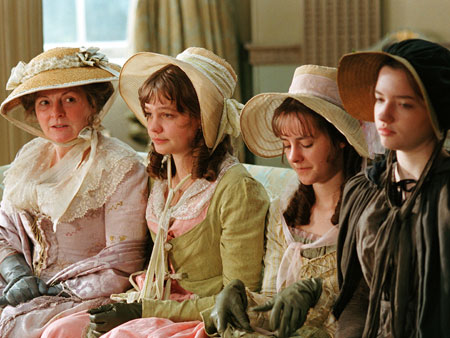
---Mrs. Bennett, in this world where eligible marriages for young ladies are chief objectives, had succeeded in her aim, using her good looks while she had them. Mrs. Bennett's main concern was marrying off the elder Bennett girls to men with monetary means. They had beauty and intelligence, but an inconsiderable fortune. Austen reveals that, "It is a truth universally acknowledged that a single man in possession of a good fortune, must be in want of a wife," (Austen 1). Mrs. Bennett's desire to have her children married, through her expression of that desire reveals the defects of her character in a richly comic manner, is itself natural and laudable; "for girls of negligible fortune genteelly brought up must secure their man while they may, or face a precarious shabby genteel spinsterhood with few opportunities of personable satisfaction or social esteem,"---
Mrs. Bennet’s frantic and unscrupulous efforts to marry off her daughters come very near to ruining their chances of making a good marriage. On this ironical situation much of Jane Austen’s comedy rests- yet were it not for the happy ending, the irony would seem more tragic than comic, and so it seems to Elizabeth Bennet, most of whose family appears to her as a curse. Only a victory over pride and prejudice can break down the social barriers between the equally aristocratic souls of Elizabeth and Mr. Darcy, and this victory they achieve despite the foolishness of the plebian Mrs. Bennet and of the noble Lady Catherine de Bourgh.
“Show-business gossip has it that television will soon unlace Billie Piper upon us again as Belle du Jour – not the Catherine Deneuve Belle du Jour but the “sex worker” who has been confiding the secrets of her profession in a blog subtitled “The diary of a London call girl”. No doubt it says a lot for Billie Piper’s versatility that she can be asked to play Fanny Price one week and Belle du Jour the next. But it also says something about us that we can’t tell the difference.” ( Howard Jacobson )
Nunnery-brothel, madonna-whore, Billie Piper-Fanny Price – do these conflations betray an essential ambiguity at the heart of women, or just an essential sentimentality at the heart of men which women, for their own reasons, permit us to go on indulging?
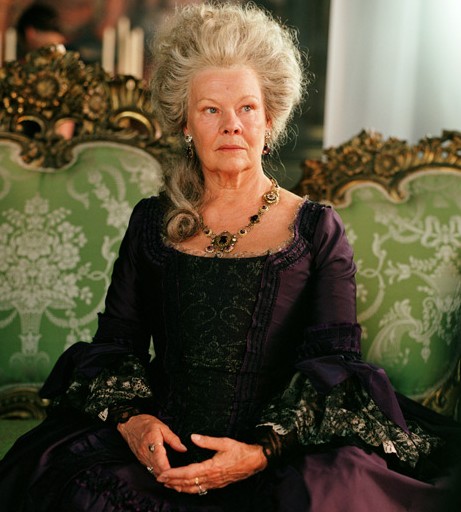
"Oh, Charlotte says she hardly ever does. It is the greatest of favours when Miss de Bourgh comes in." "I like her appearance," said Elizabeth, struck with other ideas. "She looks sickly and cross. Yes, she will do for him very well. She will make him a very proper wife." Mr. Collins and Charlotte were both standing at the gate in conversation with the ladies; and Sir William, to Elizabeth's high diversion, was stationed in the doorway, in earnest contemplation of the greatness before him, and constantly bowing whenever Miss de Bourgh looked that way.
When in 1816, the Prince Regent’s librarian suggested to Jane Austen that she write a “historical romance” in the manner of Walter Scott, she replied: “You are very kind in your hints as to the sort of composition which might recommend me at present, and I am fully sensible that an historical romance, founded on the House of Saxe Cobourg, might be much more to the purpose of profit or popularity than such pictures of domestic life in country villages as I deal in. But I could no more write a romance than an epic poem. I could not sit seriously down to write a serious romance under any other motive than to save my life; and if it were indispensable for me to keep it up and never relax into laughing at myself or other people, I am sure I should be hung before I had finished the first chapter. No, I must keep to my own style and go on in my own way; and though I may never succeed again in that, I
convinced that I should totally fail in any other.” ( Jane Austen to J.S. Clarke )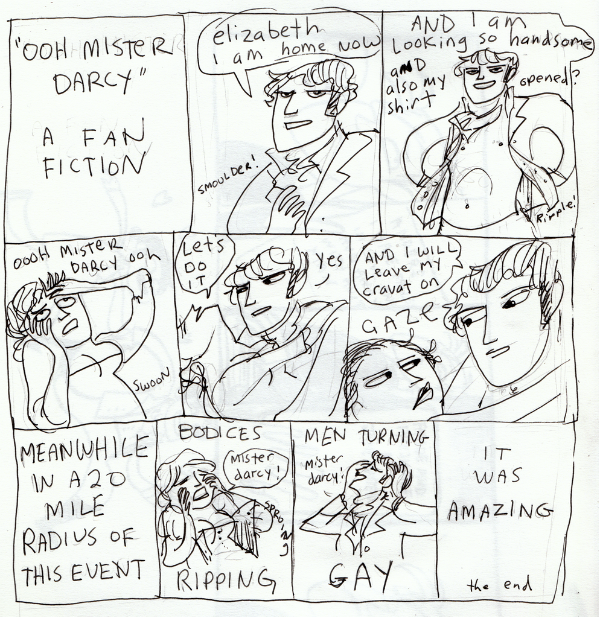
"In spite of her deeply-rooted dislike, she could not be insensible to the compliment of such a man’s affection, and though her intentions did not vary for an instant, she was at first sorry for the pain he was to receive; till, roused to resentment by his subsequent language, she lost all compassion in anger. She tried, however, to compose herself to answer him with patience, when he should have done. He concluded with representing to her the strength of that attachment which, in spite of all his endeavours, he had found impossible to conquer; and with expressing his hope that it would now be rewarded by her acceptance of his hand. As he said this, she could easily see that he had no doubt of a favourable answer. He spoke of apprehension and anxiety, but his countenance expressed real security. Such a circumstance could only exasperate farther,..."
Not than Jane Austen was incapable of taking anything seriously; she could not take herself or her art seriously unless she was allowed to laugh or smile. Her novels are comedies not only because they are comic in spirit but because her temperament and dialectics were fundamentally ironical. They are comedies even in their structure and technique.

Billie Piper. Jacobson:What we don't know from her lively prose, though, is whether Belle du Jour is peddling a sentimentality of her own. At one time it was the tart with the heart of gold; now it's the brisk modern woman of business who eats at the best restaurants, stays at the best hotels and knows that her body is her own to do with as she chooses. But are we ever our own to do with as we choose? Mustn't motivation and satisfaction be as complex and conditional when you mix sex with money as when you mix it with romance?
…In its original time, Harding’s work was path-breaking. The title essay, first published in 1940 in Scrutiny,helped launch the contemporary understanding of Austen as an author engaged with her historical moment in ambivalent, even potentially subversive ways. “Regulated Hatred” attacked the then-conventional notion that Austen was a kindly writer who presented with affectionately delicate satire the foibles of her limited society. Not only was that society under attack from the aggression of her pen, but her readers (and, one suspects, many of her presentday readers) are ridiculed by the very fictions they so innocently consume: “her books are, as she meant them to be, read and enjoyed by precisely the sort of people whom she disliked; she is a literary classic of the society which attitudes like hers, held widely enough, would undermine.” …
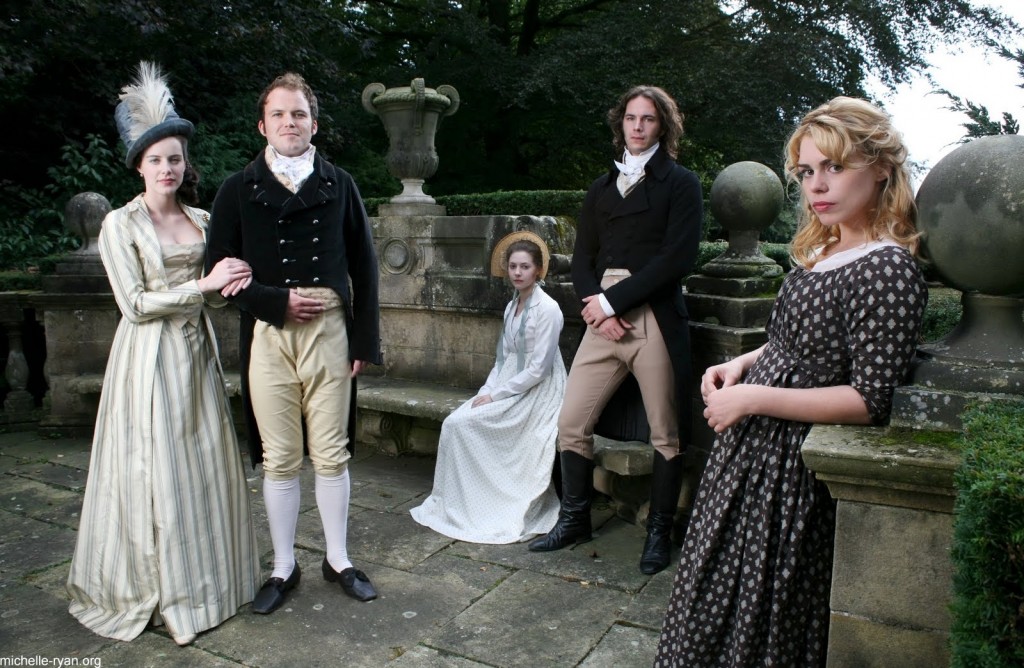
Mansfield Park. John Spence:Harding assumes that a novelist’s principal aim is to make readers like or dislike the characters. If you agree with this, you are likely to find what he says convincing. But I find this the source of the problem of his analysis. I believe Austen’s aim was far more complicated and immeasurably more difficult to achieve. She asks the reader to imagine, not simply to observe. She wanted us to experience, though perhaps unwittingly, what it is to live within the limitations of any particular individual. It is a hallmark of her genius, as it is of Shakespeare’s, that we know as completely what it is like to be a minor character as it is to be the hero or heroine, to be a Mr. Woodhouse as it is to be an Emma. In a psychologist’s file, the dossier on Mr. Woodhouse or Mrs. Norris would be as hefty as the one on Emma or Fanny Price. Therefore, Harding seems to imply, minor characters cannot be taken seriously in their own right. They are merely puppets used to relieve Austen’s own frustrations and annoyances. But his distinction doesn’t really exist in literature. As Vladimir Nabokov remarked, ‘Fiction is the true democracy.’ All characters have the equal right to exist.
…But there is a lot more here than an attack upon complaisant readers. “Character and Caricature in Jane Austen” is an astonishingly perceptive analysis of the different ways in which Austen presents characters in her novels. Harding describes the difference in technique and effect of Austen’s “characters” and “caricatures” in their initial drawing and in their interactions in the text. Harding injects psychological analysis into his literary readings, creating the sense of Austen as a subversively comic writer: “the technique of caricature allows Jane Austen to express what a person of her acute insight must always feel–astonishment at the way the most outrageously deformed personalities are allowed an effective part in society, because society attends seriously to lip service and rationalization.”…
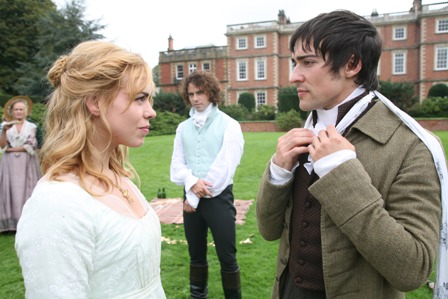
spence:She didn’t expect us to fall in love with Fanny; she wanted us to become Fanny, to experience what it is like to be Fanny Price. It is an experience most of us resist. We, like Harding, have long been conditioned to fall in love with the heroine. We are confused. Austen doesn’t ultimately care whether we like Fanny or not. She insists on nothing about Fanny Price except her right to exist – in fiction as in life.
Her basic plots follow the time tested technique of comedy- the obstacles and misunderstandings that must be overcome by lovers before they end by marrying each other: it is a dramtic convention to call this a happy ending. In her characterizations she relies to an unusually large extent on dialogue. She never, or hardly ever, describes her characters, preferring to let them talk as much as they like and thus unconsciously give themselves away. The illusion of their reality is created not by analysis or description but by their subtle interaction on one another, a secret she mastered more thoroughly than many a dramatist, and she observes the spirit of the classical rules of unity of time, place and action- taking advantage of the latitude allowed to comedy.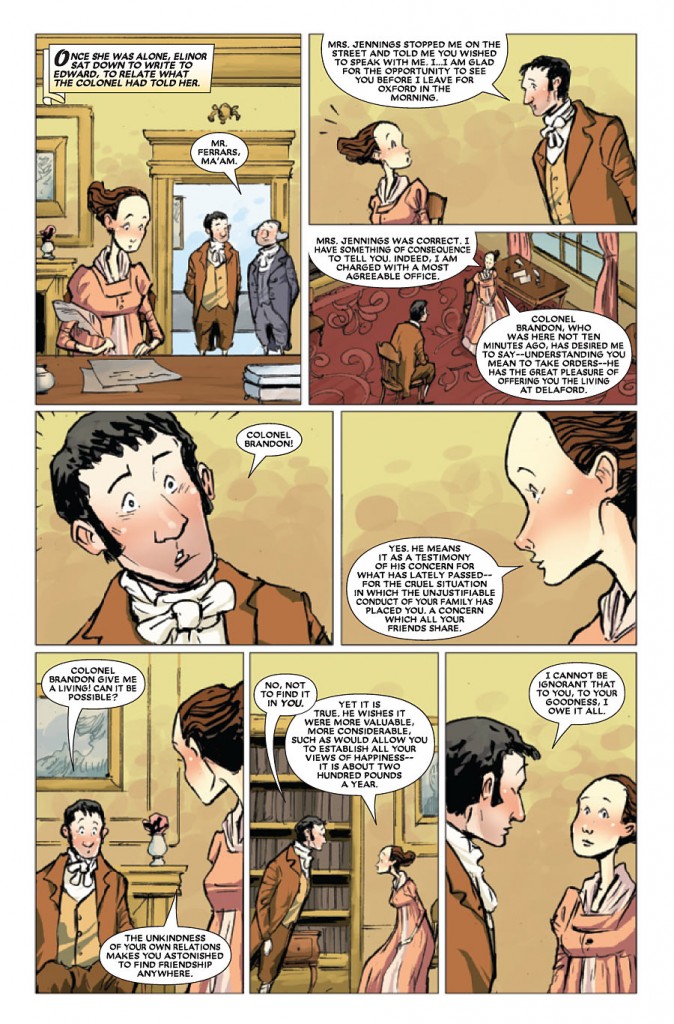
As even in the best of theatrical comedies, her denouements are the weakest part of her novels: to bring about a happy ending some “deux ex machina” is invariably required, whereas catatrophes come about quite naturally. Despite all this, her novels are novels, not plays in novel form. There have been dramatic adaptations of “Pride and Prejudice” , yet whatever their merits, they cannot do justice to the original. The reason is chiefly that, unlike works written for the stage, hers can gain nothing and indeed are likely to lose something by being represented physically. Her art consists in letting her characters come to life so completely, through the use of dramatic techniques, that the reader can realize them in his mind more vividly than any group of actors can impersonate them.
ADDENDUM:
Jan Fergus:My favorite example of Austen’s comfort with the carnal, however, lies in her comment to Cassandra about a visit to a fashionable ladies’ boarding school in London: “It was full of all the modern Elegancies—& if it had not been for some naked Cupids over the Mantlepeice, which must be a fine study for Girls, one should never have Smelt Instruction” (20 May 1813). The words “study,” “naked,” and capitalized “Smelt” combine to pack this sentence with comedy. The explicit contrast between modern vacuous but elegant education and the nakedness of the cupids is perfect, and Austen shows her ease both with the body and with young girls’ intense curiosity about male bodies with the wonderful word “Smelt”: though it ostensibly refers to a visitor’s being unable to detect anything like instruction in the schoolroom apart from the cupids, “Smelt” carries over to the girls’ own bodies and their eager response to the male genitalia before them—as if they are sticking their noses right in there.
Austen’s ease with the body can become impatience when motherhood is the topic, as many letters witness: she goes from joking about failed fertility in Mrs. Hall to outright desiring fewer pregnancies as she sees huge families multiply around her and loses two sisters-in-law to childbirth— Edward’s wife Elizabeth in 1808 after the birth of her eleventh child in not
quite seventeen years of marriage, and Fanny Palmer, her brother Charles’s wife who married at seventeen and died before twenty-five, after giving birthto her fourth child. Austen’s comments are initially funny on the topic: she wrote of Henry’s partner’s wife, Mrs. Tilson, “poor Woman! how can she be honestly breeding again?” (1 October 1808)—that is, Mrs. Tilson was pregnant with an eighth child in eleven years….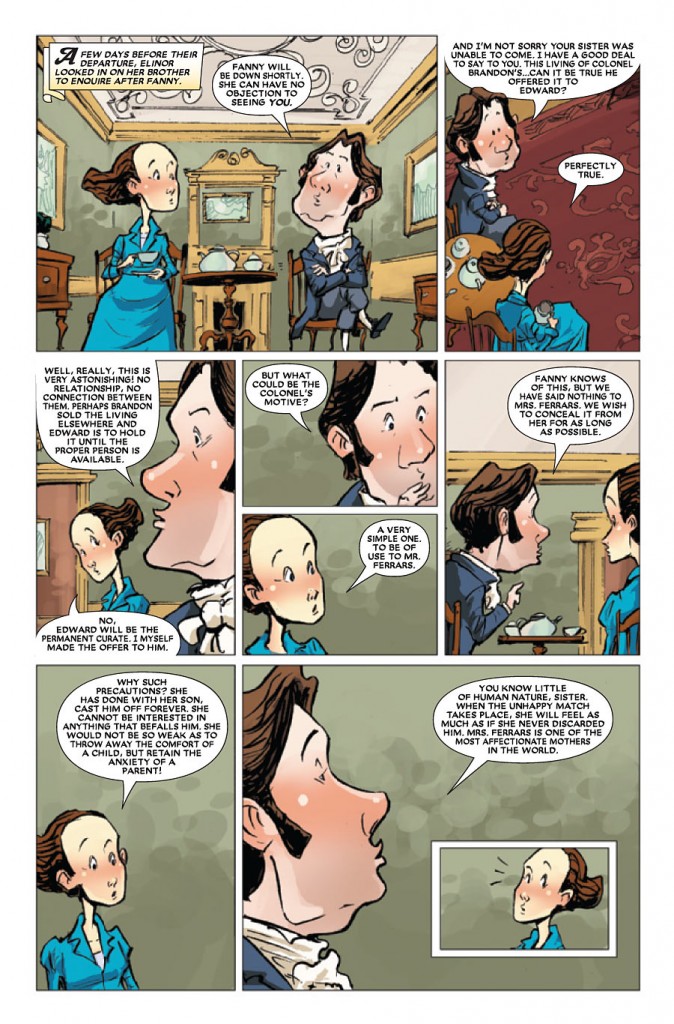


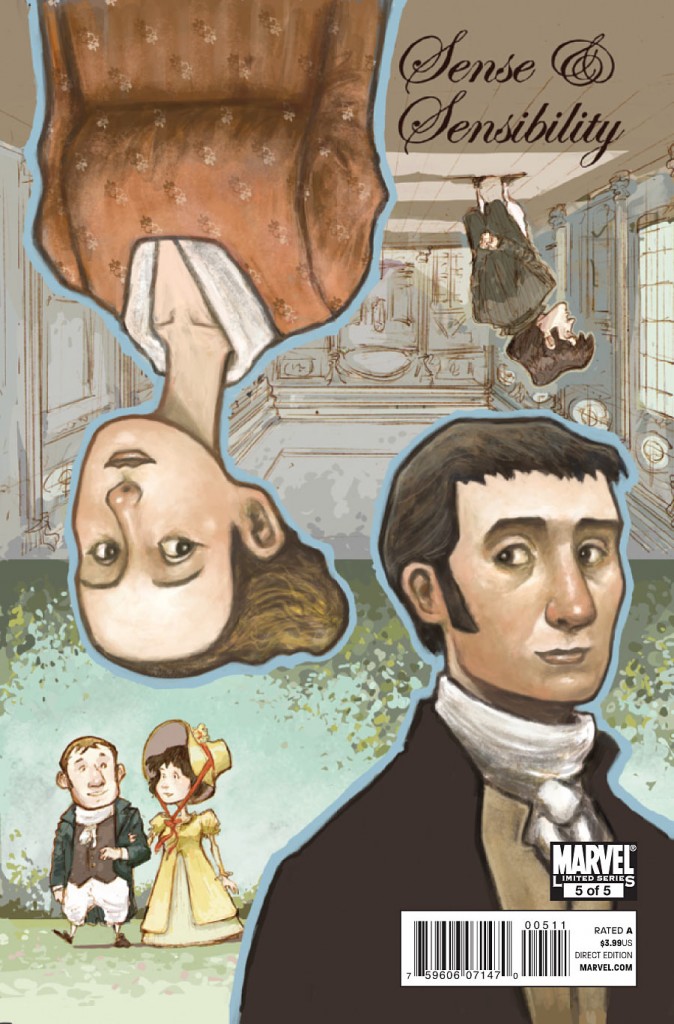
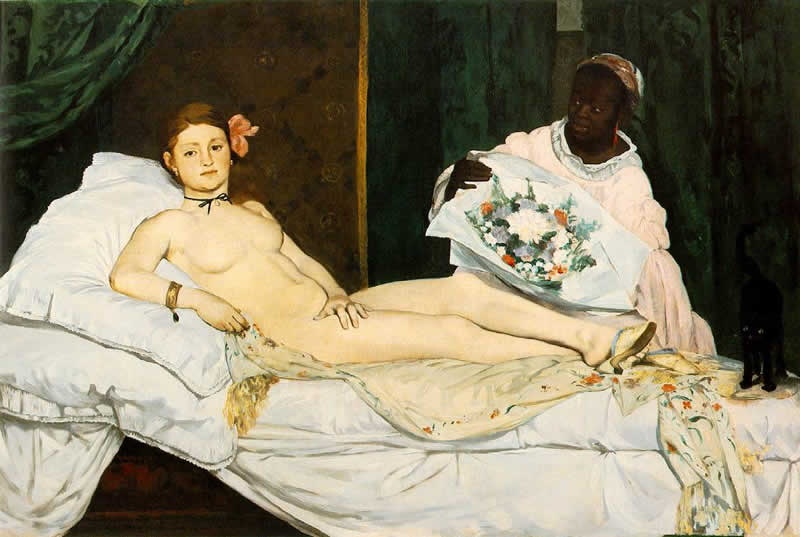



 COMMENTS
COMMENTS